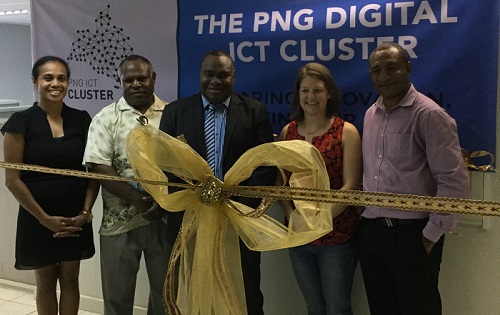Advancing entrepreneurship in Papua New Guinea

Patron Hon Davis Steven- Minister for Justice and Attorney General, with Co-founders of the PNG Digital ICT Cluster and Program Director of University of California Accelerator Innovation Group
With Papua New Guinea as the chair for APEC 2018, attention is focused on the challenges facing PNG today and its ambitions for the future.
Just like its APEC counterparts, PNG leaders, policy makers and business aspire to a digital future. However, to advance entrepreneurship in PNG, the nation must overcome a number of critical issues, including inadequate infrastructure, limited internet access, the need to build human capacity, and introduce appropriate regulatory policies.
The PNG Digital ICT Cluster
To kickstart the foundation of a domestic start-up culture and a supportive ecosystem, the PNG Digital ICT Cluster (PNGD-ICT Cluster) was launched as a registered association by its Patron, the Hon. Davis Steven, Minister for Justice and Attorney-General of PNG, on 13 June 2018.
APEC’s Startup Leadership Summit, held in Taiwan in 2013, the EU Regional Cluster Study of 2014 and the 2015 US International Visitors Leadership Program have highlighted the benefits to business development of clusters to share information, offer networking opportunities and improve national capabilities. The PNGD-ICT Cluster offers a unique platform for innovative partnerships between business, universities and public authorities.
The use of ‘smart devices’ in economic life and social organisation will be a growing source of prosperity for PNG over the next decade, and the PNGD-ICT Cluster looks to become one of the most attractive and competitive ICT clusters in the Pacific. A location for domestic start-ups and global technology companies in PNG that will open markets, foster new international collaborations and attract Direct Foreign Investment.
After 20 years of digital connectivity, SMEs generate only 6% of PNG’s GDP, rather than the 20% to 50% seen in most APEC economies. However, the launch of the new cluster signifies a new era in PNG entrepreneurship, driven by a group of pioneering ICT entrepreneurs and computer science graduates from the PNG University of Technology.
The drive to create this social enterprise was fueled by their challenges in gaining the access to finance, mentoring and coaching they require to translate their ideas into marketable products over the last ten years.
Despite the challenges they have faced, several founding members have received professional awards and scholarships from universities in the USA, Australia, New Zealand, Japan and Europe, giving them experience in start-ups and digital ecosystems.
The Port Moresby Accelerator
The launch of the Cluster coincided with the one-day TechInnovate 2018 event in Port Moresby. The conference examined PNG’s “Digital Divide” and raised funds for an SME Accelerator program created in partnership with the University of California.
This Accelerator program will support the development of innovative small and medium-sized firms in Port Moresby and hopes to welcome 100 participants, from existing firms and new startups, into the 7-week scheme.
The Badili Digital Lab
The DPNG-ICT Cluster has also opened a Digital lab in Badili in Port Moresby, hosted in premises donated by a real estate firm for the next years. The lab encourages female participation and can host up to 20 entrepreneurs in all sectors of the economy, including agriculture, health, education, financial services.
While young entrepreneurs are the driving force of job creation, they need help to enter ecosystems shaped by large companies and translate their ideas into marketable products and services. Therefore, the cluster is reaching out to large companies and exploring ‘bridge markets’ as well as improving their access to funding and training.
A Bright Digital Future for PNG?
The determination of the founders of the PNGD-ICT Cluster to embrace the 4th Industrial revolution offers a golden opportunity for collaboration with projects at the district, provincial and national level.
These may include investing in rural telecommunications by using drones as pseudo-satellites, and the collection of ‘big data’ for machine learning, automation and blockchain ledgers. As these once expensive technologies become cheaper and more accessible, improved internet connectivity offers exciting opportunities for collaboration with international peers.
Whilst it can take 20 years for a vibrant entrepreneurial ecosystem to evolve in a city or region, the PNG Digital ICT Cluster is already working towards closing the gap and improving the contribution which SMEs make to PNG’s economy, with the support of its partners and sponsors.
Winifred Kula Amini leads WIN-IT Consultancy – a private consulting firm which helps address the social and developmental issues facing Papua New Guinea and the Pacific region through research and development of tailored ICT solutions.












